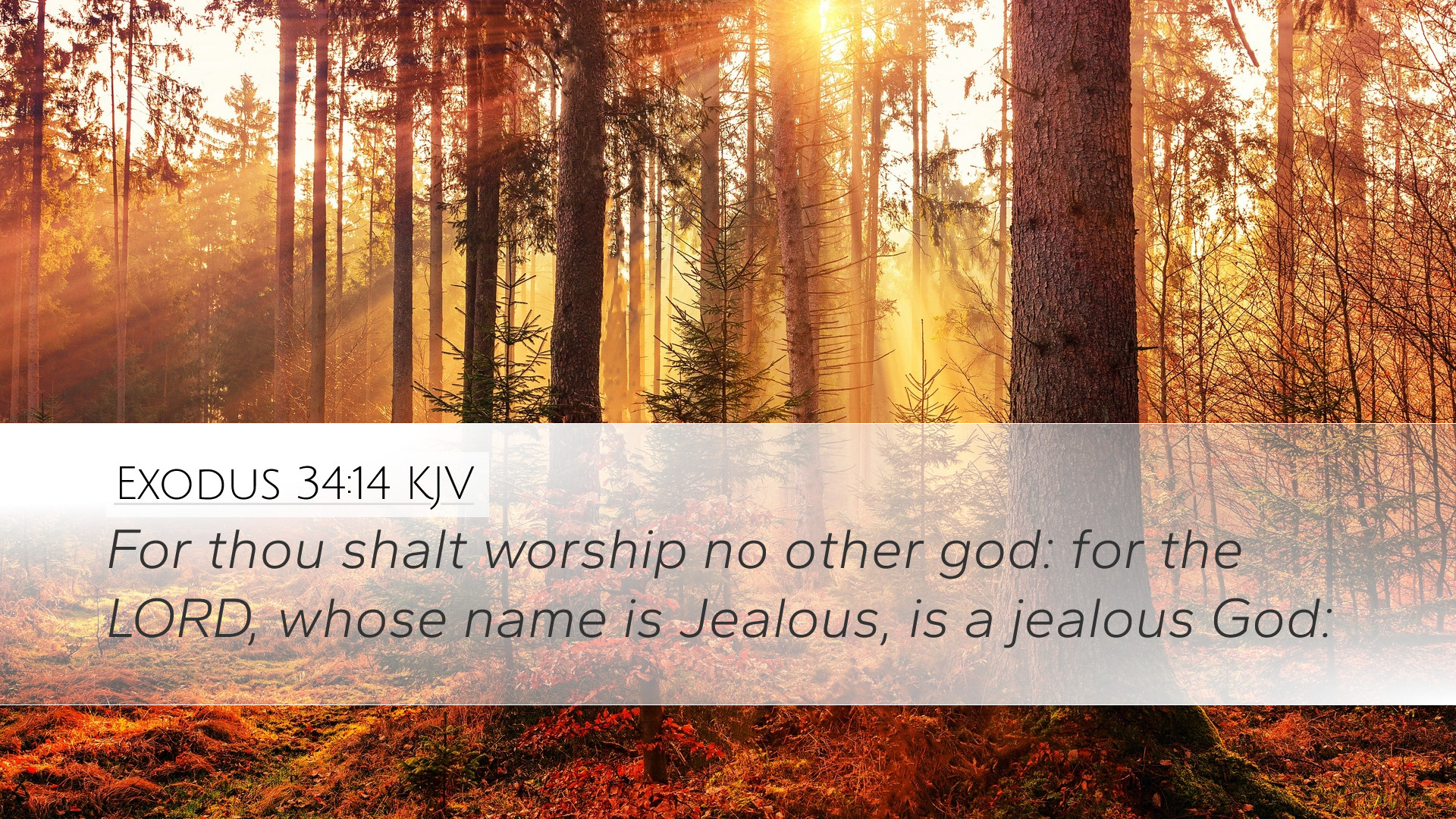Commentary on Exodus 34:14
Exodus 34:14 states: "For you shall worship no other god, for the Lord, whose name is Jealous, is a jealous God." This verse is pivotal, as it highlights the exclusivity and intensity of God's desire for relationship with His people. Below is a summary of insights from various public domain commentaries, aimed at pastors, students, theologians, and Bible scholars.
Historical Context
This verse occurs in a crucial moment following the sin of Israel with the golden calf. God, revealing His character, emphasizes His exclusive right to worship. The Jews, having experienced God's miraculous deliverance, are reminded of their covenantal obligation to Him alone.
Insights from Commentaries
Matthew Henry's Commentary
Matthew Henry underscores the significance of God's jealousy regarding worship. He interprets God's jealousy not as envy but as a deep concern for the relationship He desires with His people. He notes that God's jealousy is protective, indicating that He will not share His glory with any false gods.
- The Nature of God's Jealousy: Henry emphasizes that God's jealousy reflects His holiness and the covenant relationship established with Israel. It indicates His rightful claim over His people.
- Moral Implications: The warning against idolatry is evident. Henry asserts that worshiping other gods not only corrupts worship but also leads to moral degradation.
Albert Barnes' Notes on the Bible
Albert Barnes offers a detailed analysis of the term "jealous." He elucidates that the jealousy of God is akin to a husband’s jealousy for his wife, denoting a fierce protection of the relationship. He argues that God’s covenant fidelity demands undivided loyalty.
- God's Attributes: Barnes points out that the jealousy of God is connected to His love and holiness. It is an indication of His passionate commitment to His people.
- The Warning Against Idolatry: Barnes highlights that the mandate against other gods arises from God's desire for fidelity. The dangers of turning to idolatry and the consequences of forsaking the true God are front and center in this text.
Adam Clarke's Commentary
Adam Clarke presents a thorough examination of the term "jealous" in this context. He suggests that God's jealousy is a reflection of His divine nature and an assurance of His active presence among His people.
- Divine Authority: Clarke establishes that God's insistence on exclusive worship asserts His sovereignty and authority as the creator.
- Covenant Relationship: He connects this verse to the broader theme of covenant loyalty, illustrating God's resolve to remain true to His covenant with Israel, while expecting their fidelity in return.
Theological Reflections
The jealousy of God in Exodus 34:14 prompts deeper theological reflections on the nature of God's relationship with His people. It raises questions about the implications of idolatry, the importance of covenant faithfulness, and the nature of divine love.
- The Concept of Jealousy: The theological significance of God's jealousy, when understood correctly, points toward His passionate dedication to His people and His desire for a pure relationship.
- Idolatry's Consequences: The relationship between idolatry and the degradation of spiritual life is a recurrent theme in Scripture. This verse serves as a stark warning against allowing anything or anyone to take precedence over God.
- God's Covenantal Fidelity: The unwavering faithfulness of God contrasted with humanity's propensity towards infidelity calls for deeper commitment and recognition of God's presence in believers' lives.
Practical Application
For pastors and ministers, the insights from Exodus 34:14 can be applied in both teaching and personal devotion. This passage serves as a reminder of the seriousness of idolatry in modern contexts, where distractions may take the place of God.
- Identifying Idols: Encouraging congregants to reflect on personal idols can foster deeper spiritual growth and awareness of God’s rightful place in their lives.
- Championing Covenant Faithfulness: Teaching about God's jealous love can inspire commitment and devotion, reminding believers of the depth of God's desire for relationship.
- Worship Practices: Integrating themes from this passage into worship can help underscore the importance of worshiping God in spirit and truth, free from distractions and competing allegiances.
Conclusion
Exodus 34:14 provides profound insights into the nature of God and the relationship He desires with His people. The concept of jealousy in this passage transcends human emotion, presenting a divine yearning for a faithful and loving relationship. As we meditate on this verse, the call to worship God alone resonates deeply, inviting us into a deeper understanding of our covenantal obligations and the richness of God's love.


